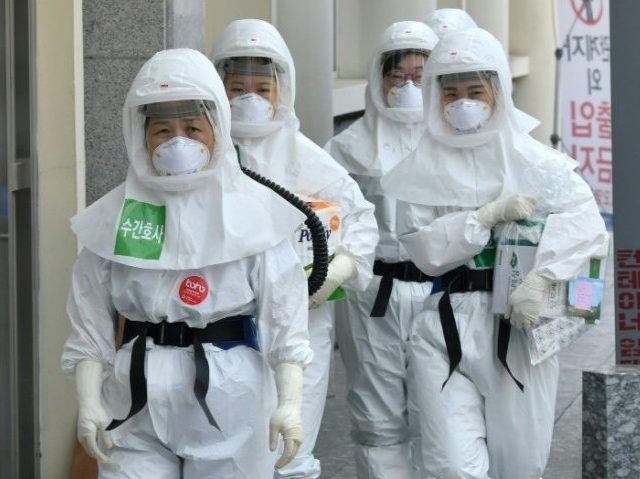South Korea’s economy shrank more than the economy of the U.S. in the first quarter of this year.
Critics of President Trump have been holding up South Korea’s economy to fault the U.S. response to coronavirus. The problem is that South Korea’s economy is struggling much more than they think. It is worse off, not better, than the U.S. And the sources of what strength it has actually support Trump’s broader economic vision.
The attempts to point to South Korea as a model for avoiding economic pain in the face of coronavirus have been very widespread in the mainstream media and among leftwing activists.
But they are based on the false premise that, as the Independent put it, “only America’s economy has been destroyed.”
In the first quarter of this year, South Korea’s economy suffered the sharpest economic contraction since the global financial crisis. Its economy contracted more than the U.S. economy in the January through March period. It is headed toward an even worse contraction in the second quarter.
Many people believe that the U.S. economy suffered a worse contraction in the first three months of the year. Why?
The confusion is likely rooted in the fact that the U.S. reports its GDP figures on a different basis than most countries. Here’s how Justin Fox of Bloomberg explained the difference:
In the U.S., the headline gross domestic product number reported every quarter by the Bureau of Economic Analysis is the percentage change in GDP from the previous quarter, annualized. Other countries, and international economic-statistics compilers such as the Organization for Economic Cooperation and Development, tend to report just the quarterly percentage change and skip the annualizing.
So when South Korea reports its GDP, it says the economy contracted a seasonally adjusted 1.4 percent. When the U.S. reports GDP, we say it contracted at a seasonally adjusted, annualized rate of 4.8 percent. That makes it sound like the U.S. contracted more but that’s just because we’re comparing apple sauce to apple pie. It’s all apples underneath but they are prepared differently.
Fortunately, the Organisation for Economic Co-operation and Development provides GDP for the U.S. on a non-annualized basis. This shows that the U.S. economy contracted just 1.22 percent compared with the previous quarter.
We can also do the apples-to-apples comparison the other way, converting the Korean figures into the U.S. reporting basis. On an annualized basis, the South Korean economy contracted 5.5 percent compared with the U.S. figure of 4.8 percent. Again, the South Korean contraction was worse than the U.S. contraction.
The other flaw with comparing the South Korean economy to the U.S. is that the economies are fundamentally different. The South Korean economy is obviously much smaller and, more importantly, it is heavily focused on exports, with between 40 percent and 50 percent of its GDP arising from exports. This means that its economy is much less dependent on internal consumer demand than the U.S., where exports account for just over 12 percent of GDP. As a result, South Korea’s employment and broader economy will suffer less from a dive in domestic consumer spending, all other things being equal.
In short, a shutdown of personal consumption spending in South Korea is going to throw a much smaller slice of workers out of their jobs than a shutdown in the U.S. because a much smaller percentage of Koreans work in businesses dependent on that spending.
To really see if South Korea’s coronavirus policies had a positive economic effect, we need to narrow the focus to consumer spending. Private consumption spending in South Korea fell 6.2 percent. The U.S. reported a 7.2 percent decline but again that is on an annualized basis. If we annualize the South Korean figure, personal consumption spending fell at a jaw-dropping 22.6 percent rate.
This does not mean that South Korea’s approach to tackling the coronavirus was not more successful in terms of public health or limiting deaths. But it does indicate that the South Korean approach did not allow it to avoid economic pain on the level the U.S. is experiencing due to lockdowns. On all the relevant measures, South Korea is doing worse.
The irony of President Trump’s critics using South Korea–or Taiwan or Germany–to attack his coronavirus policies is that they are unwittingly attacking the decades of deindustrialization that Trump campaigned against in 2016. The main economic advantage these countries have when it comes to the coronavirus is that their economy is less vulnerable to dramatic declines in domestic consumption. Choosing to bolster and protect domestic manufacturing gave those economies so cushion against the coronavirus crash.
That said, even that cushion has its limits. As the coronavirus has dampened demand for South Korea’s exports, its economy is likely to decline even more in the second quarter. And that is already happening.
South Korea’s export-driven economy may have initially held off some of the job losses the U.S. experience in April but that’s unlikely to last. And its economic contraction, so far, has been worse than the U.S. experience.

COMMENTS
Please let us know if you're having issues with commenting.